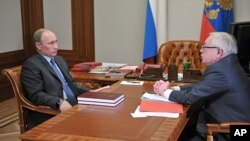MOSCOW —
Hundreds of non-governmental organizations across Russia say they have been raided and harassed by the government in recent weeks. President Vladimir Putin says they are being inspected to make sure they comply with a law meant to stop foreign countries from meddling in domestic affairs.
Activists say their organizations are facing pressure and surprise inspections by authorities ranging from tax officials to fire inspectors.
Russian President Vladimir Putin defended the spot checks. Putin says the prosecutor general is required to check the legal activity of government bodies and social organizations. He says that the goal of these inspections is to see whether the activities of an NGO match its stated goals. Putin also says that the inspections are meant to make sure the NGOs are not being politically financed from abroad.
Since assuming the presidency again last May, Putin has maintained that foreign countries, mainly the United States, have been encouraging and funding the mass protests he has faced since Russian parliamentary elections in 2011 - a charge Washington denies.
As a result, non-governmental organizations that receive foreign funding and participate in political activities are now required to register as "foreign agents," a term that dates back to Soviet times and is synonymous with espionage.
Critics across the globe have denounced the widespread, surprise searches. France and Germany called in Russia’s ambassadors to explain the inspections. Britain, the U.S. and the EU have expressed concern.
Oleg Orlov is chairman of Memorial, one of Russia’s oldest human rights groups.
"Offices are drowning in a huge amount of paperwork from dozens of organizations. How organizations are supposed to deal with the bureaucracy? I believe that the outcome of the searches is pre-determined, and the NGOs will be labeled foreign agents by the government," said Orlov.
If found guilty of being a foreign agent, organizations face criminal fines, among other things.
Pavel Chikov is a member of Russia’s Presidential Council on Human Rights.
"The inspections are either completely unprofessional, or their goal is to paralyze the NGOs for a little while and scare them," said Chikov.
Organizations like Human Rights Watch and Amnesty International have faced the most pressure and inspections, but other groups, including those promoting bird watching and offering French lessons, have also been targeted.
Chikov says that agencies with no connection to the foreign NGO law, including the fire, labor and health departments, have joined in to harass the organizations.
The Kremlin maintains it is merely trying to enforce the law.
Activists say their organizations are facing pressure and surprise inspections by authorities ranging from tax officials to fire inspectors.
Russian President Vladimir Putin defended the spot checks. Putin says the prosecutor general is required to check the legal activity of government bodies and social organizations. He says that the goal of these inspections is to see whether the activities of an NGO match its stated goals. Putin also says that the inspections are meant to make sure the NGOs are not being politically financed from abroad.
Since assuming the presidency again last May, Putin has maintained that foreign countries, mainly the United States, have been encouraging and funding the mass protests he has faced since Russian parliamentary elections in 2011 - a charge Washington denies.
As a result, non-governmental organizations that receive foreign funding and participate in political activities are now required to register as "foreign agents," a term that dates back to Soviet times and is synonymous with espionage.
Critics across the globe have denounced the widespread, surprise searches. France and Germany called in Russia’s ambassadors to explain the inspections. Britain, the U.S. and the EU have expressed concern.
Oleg Orlov is chairman of Memorial, one of Russia’s oldest human rights groups.
"Offices are drowning in a huge amount of paperwork from dozens of organizations. How organizations are supposed to deal with the bureaucracy? I believe that the outcome of the searches is pre-determined, and the NGOs will be labeled foreign agents by the government," said Orlov.
If found guilty of being a foreign agent, organizations face criminal fines, among other things.
Pavel Chikov is a member of Russia’s Presidential Council on Human Rights.
"The inspections are either completely unprofessional, or their goal is to paralyze the NGOs for a little while and scare them," said Chikov.
Organizations like Human Rights Watch and Amnesty International have faced the most pressure and inspections, but other groups, including those promoting bird watching and offering French lessons, have also been targeted.
Chikov says that agencies with no connection to the foreign NGO law, including the fire, labor and health departments, have joined in to harass the organizations.
The Kremlin maintains it is merely trying to enforce the law.




